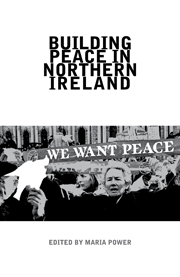Book contents
- Frontmatter
- Contents
- Acknowledgements
- Contributors
- 1 Introduction: Peacebuilding in Northern Ireland
- 2 Understanding the Role of Non-aligned Civil Society in Peacebuilding in Northern Ireland: Towards a Fresh Approach
- 3 The Role of Civil Society in Promoting Peace in Northern Ireland
- 4 The Contribution of Integrated Schools to Peacebuilding in Northern Ireland
- 5 Providing a Prophetic Voice? Churches and Peacebuilding, 1968–2005
- 6 ‘Peace Women’, Gender and Peacebuilding in Northern Ireland: From Reconciliation and Political Inclusion to Human Rights and Human Security
- 7 Encumbered by Data: Understanding Politically Motivated Former Prisoners and the Transition to Peace in Northern Ireland
- 8 Loyalism and Peacebuilding in the 2000s
- 9 Civil Society, the State and Conflict Transformation in the Nationalist Community
- 10 Examining the Peacebuilding Policy Framework of the Irish and British Governments
- 11 Building Peace and Crossing Borders: The North/South Dimension of Reconciliation
- 12 Peace Dividends: The Role of External Aid in Peacebuilding
- Index
5 - Providing a Prophetic Voice? Churches and Peacebuilding, 1968–2005
- Frontmatter
- Contents
- Acknowledgements
- Contributors
- 1 Introduction: Peacebuilding in Northern Ireland
- 2 Understanding the Role of Non-aligned Civil Society in Peacebuilding in Northern Ireland: Towards a Fresh Approach
- 3 The Role of Civil Society in Promoting Peace in Northern Ireland
- 4 The Contribution of Integrated Schools to Peacebuilding in Northern Ireland
- 5 Providing a Prophetic Voice? Churches and Peacebuilding, 1968–2005
- 6 ‘Peace Women’, Gender and Peacebuilding in Northern Ireland: From Reconciliation and Political Inclusion to Human Rights and Human Security
- 7 Encumbered by Data: Understanding Politically Motivated Former Prisoners and the Transition to Peace in Northern Ireland
- 8 Loyalism and Peacebuilding in the 2000s
- 9 Civil Society, the State and Conflict Transformation in the Nationalist Community
- 10 Examining the Peacebuilding Policy Framework of the Irish and British Governments
- 11 Building Peace and Crossing Borders: The North/South Dimension of Reconciliation
- 12 Peace Dividends: The Role of External Aid in Peacebuilding
- Index
Summary
When the Troubles began, the Protestant and Catholic Churches, long seen as ‘tribal chaplains’ to the two main cultural traditions in Northern Ireland, came under close scrutiny and questions were asked regarding their role in perpetuating the conflict as well as the efforts they were making towards peace and reconciliation. For example, in an article published in the Guardian in 1973, a former Church of Ireland Bishop, Richard Hanson, reflected upon these issues:
the innocent English inquirer asks ‘What are the Churches doing about this situation? Surely this is precisely a situation in which applied Christianity can heal?’ Innocent simpleton. The Churches are part of the situation. They have very largely contributed to produce it and it could indeed be argued that they benefit from it: All the major denominations in Northern Ireland: Roman Catholics, Presbyterians, Church of Ireland and Methodists … are captive Churches. They have long ago sold their integrity and spiritual and intellectual independence to political ideologies in return for the massive support of the people of Northern Ireland.
The article concludes with a suggestion that ‘much more could be done to encourage the mixing together for religious purposes of Catholics and Protestants’. Such assessments have been repeated through various media over the past 40 years. As the conflict has worn on, these ‘pleas for peace’ have matured, moving away from a culture of blame, towards one in which practical suggestions were made for progression:
Disputes between believers are a scandal. There is an urgent need for the Churches throughout Ireland to encourage their members to address in a constructive fashion the issues and traditions which divide believers. This requires internal debate and self-examination as well as dialogue and meetings between Churches at every level.
- Type
- Chapter
- Information
- Building Peace in Northern Ireland , pp. 73 - 92Publisher: Liverpool University PressPrint publication year: 2011
- 2
- Cited by



